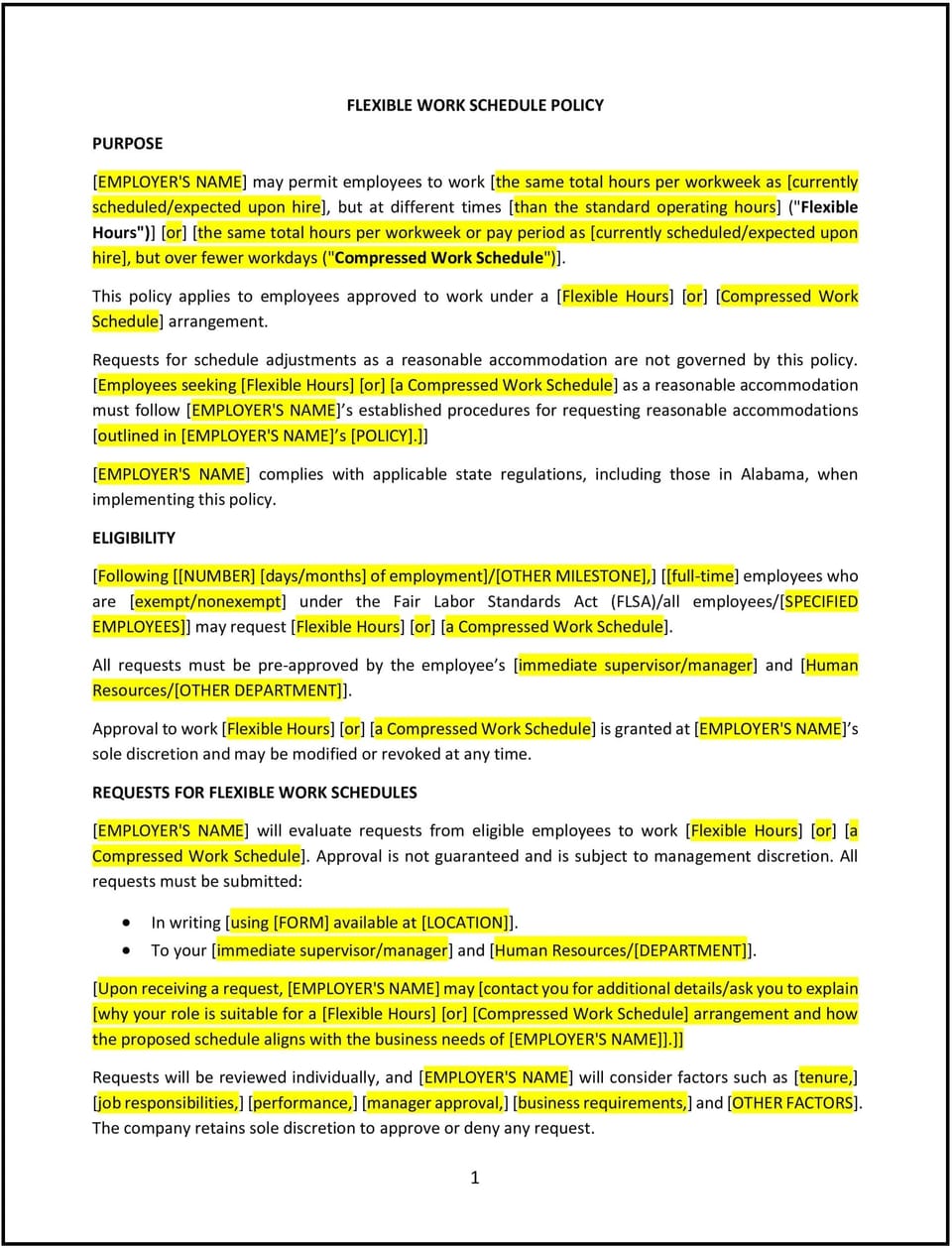Flexible work schedule policy (Alabama): Free template

Flexible work schedule policy (Alabama)
A flexible work schedule policy allows employees to adjust their working hours to better balance personal and professional responsibilities. For SMBs in Alabama, this policy supports productivity and employee satisfaction by accommodating diverse needs while maintaining operational efficiency.
By clearly defining options such as flexible start and end times, compressed workweeks, or remote work arrangements, this policy fosters a supportive and adaptive workplace culture.
How to use this flexible work schedule policy (Alabama)
- Define flexible options: Specify the types of flexible arrangements available, such as adjustable start and end times, remote work, or a four-day workweek.
- Establish eligibility criteria: Clarify which employees or roles are eligible for flexible schedules, considering factors like job responsibilities and performance requirements.
- Detail the approval process: Explain how employees can request flexible schedules, including required documentation and who must approve the request.
- Outline expectations: Provide clear guidelines on maintaining productivity, meeting deadlines, and staying accessible during work hours.
- Address potential adjustments: Specify that flexible arrangements are subject to review and adjustment based on business needs or performance.
Benefits of using a flexible work schedule policy (Alabama)
A flexible work schedule policy offers numerous advantages for your business and employees. Here’s how it helps:
- Boosts employee morale: Demonstrates your commitment to supporting work-life balance, enhancing job satisfaction and loyalty.
- Improves productivity: Allows employees to work during their most productive hours, leading to better outcomes.
- Reduces absenteeism: Accommodates personal responsibilities, reducing the need for unscheduled time off.
- Attracts top talent: Positions your company as an employer of choice by offering modern, adaptable work arrangements.
- Enhances retention: Creates a supportive work environment that encourages long-term commitment from employees.
Tips for implementing a flexible work schedule policy (Alabama)
- Communicate openly: Ensure employees understand the available options and the process for requesting flexible schedules.
- Monitor performance: Regularly evaluate the impact of flexible arrangements on productivity and address any issues promptly.
- Provide tools and resources: Equip employees with the technology and support needed for effective remote or flexible work, such as communication tools or task management software.
- Balance flexibility with accountability: Set clear expectations for availability, collaboration, and meeting deadlines to ensure flexibility doesn’t compromise team performance.
- Review periodically: Reassess the policy and its impact to ensure it continues to meet the needs of both employees and the business.
Q: What types of flexible work schedules are available under this policy?
A: Options may include flexible start and end times, compressed workweeks, remote work, or hybrid arrangements, depending on the business’s operational needs.
Q: Are all employees eligible for flexible work schedules?
A: Eligibility depends on the role, responsibilities, and individual performance, as outlined in the policy.
Q: How do employees request a flexible schedule?
A: Employees should submit a formal request to their supervisor or HR, detailing the desired arrangement and how it will support their role.
Q: Can flexible schedules be temporary?
A: Yes, flexible arrangements may be approved for a specific duration or subject to periodic review based on business needs.
Q: How does the company ensure fairness in granting flexible schedules?
A: Requests are evaluated consistently based on eligibility criteria, job requirements, and the impact on team performance.
Q: What happens if a flexible arrangement isn’t working?
A: If an arrangement negatively affects productivity or operations, the company may modify or revoke it, providing appropriate notice to the employee.
This article contains general legal information and does not contain legal advice. Cobrief is not a law firm or a substitute for an attorney or law firm. The law is complex and changes often. For legal advice, please ask a lawyer.


